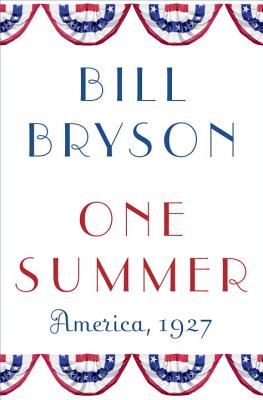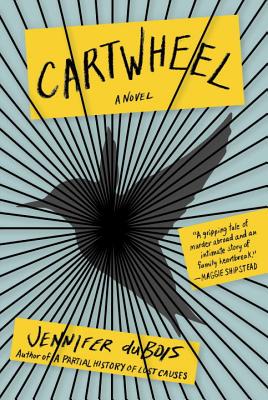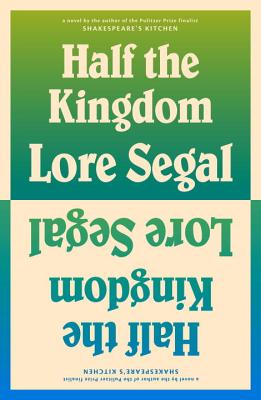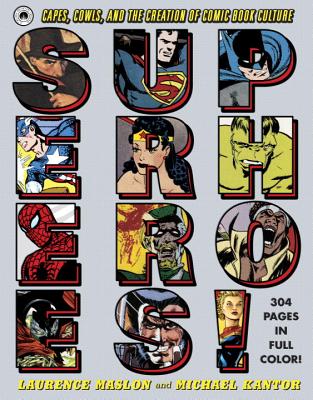 In One Summer Bill Bryson, one of our greatest and most beloved nonfiction writers, transports readers on a journey back to one amazing season in American life.
In One Summer Bill Bryson, one of our greatest and most beloved nonfiction writers, transports readers on a journey back to one amazing season in American life. The summer of 1927 began with one of the signature events of the twentieth century: on May 21, 1927, Charles Lindbergh became the first man to cross the Atlantic by plane nonstop, and when he landed in Le Bourget airfield near Paris, he ignited an explosion of worldwide rapture and instantly became the most famous person on the planet. Meanwhile, the titanically talented Babe Ruth was beginning his assault on the home run record, which would culminate on September 30 with his sixtieth blast, one of the most resonant and durable records in sports history. In between those dates a Queens housewife named Ruth Snyder and her corset-salesman lover garroted her husband, leading to a murder trial that became a huge tabloid sensation. Alvin “Shipwreck” Kelly sat atop a flagpole in Newark, New Jersey, for twelve days—a new record. The American South was clobbered by unprecedented rain and by flooding of the Mississippi basin, a great human disaster, the relief efforts for which were guided by the uncannily able and insufferably pompous Herbert Hoover. Calvin Coolidge interrupted an already leisurely presidency for an even more relaxing three-month vacation in the Black Hills of South Dakota. The gangster Al Capone tightened his grip on the illegal booze business through a gaudy and murderous reign of terror and municipal corruption. The first true “talking picture,” Al Jolson’s The Jazz Singer, was filmed and forever changed the motion picture industry. The four most powerful central bankers on earth met in secret session on a Long Island estate and made a fateful decision that virtually guaranteed a future crash and depression.
All this and much, much more transpired in that epochal summer of 1927, and Bill Bryson captures its outsized personalities, exciting events, and occasional just plain weirdness with his trademark vividness, eye for telling detail, and delicious humor. In that year America stepped out onto the world stage as the main event, and One Summer transforms it all into narrative nonfiction of the highest order.
This stunning Civil War novel from best-selling author Dennis McFarland brings us the journey of a nineteen-year-old private, abandoned by his comrades in the Wilderness, who is struggling to regain his voice, his identity, and his place in a world utterly changed by what he has experienced on the battlefield.
In the winter of 1864, Summerfield Hayes, a pitcher for the famous Eckford Club, enlists in the Union army, leaving his sister, a schoolteacher, devastated and alone in their Brooklyn home. The siblings, who have lost both their parents, are unusually attached, and Hayes fears his untoward secret feelings for his sister. This rich backstory is intercut with scenes of his soul-altering hours on the march and at the front—the slaughter of barely grown young men who only days before whooped it up with him in a regimental ball game; his temporary deafness and disorientation after a shell blast; his fevered attempt to find safe haven after he has been deserted by his own comrades—and, later, in a Washington military hospital, where he finds himself mute and unable even to write his name. In this twilit realm, among the people he encounters—including a compassionate drug-addicted amputee, the ward matron who only appears to be his enemy, and the captain who is convinced that Hayes is faking his illness—is a gray-bearded eccentric who visits the ward daily and becomes Hayes’s strongest advocate: Walt Whitman. This timeless story, whose outcome hinges on friendships forged in crisis, reminds us that the injuries of war are manifold, and the healing goodness in the human soul runs deep and strong.
When Lily Hayes arrives in Buenos Aires for her semester abroad, she is enchanted by everything she encounters: the colorful buildings, the street food, the handsome, elusive man next door. Her studious roommate Katy is a bit of a bore, but Lily didn’t come to Argentina to hang out with other Americans.
Five weeks later, Katy is found brutally murdered in their shared home, and Lily is the prime suspect. But who is Lily Hayes? It depends on who’s asking. As the case takes shape—revealing deceptions, secrets, and suspicious DNA—Lily appears alternately sinister and guileless through the eyes of those around her: the media, her family, the man who loves her and the man who seeks her conviction. With mordant wit and keen emotional insight, Cartwheel offers a prismatic investigation of the ways we decide what to see—and to believe—in one another and ourselves.
In Cartwheel, duBois delivers a novel of propulsive psychological suspense and rare moral nuance. No two readers will agree who Lily is and what happened to her roommate. Cartwheel will keep you guessing until the final page, and its questions about how well we really know ourselves will linger well beyond.
The renowned New Yorker writer and Pulitzer Prize finalist Lore Segal—whom The New York Times declared "closer than anyone to writing the Great American Novel"—delivers a hilarious, poignant and profoundly moving tale of living, loving and aging in America today
At Cedars of Lebanon Hospital, doctors have noticed a marked uptick in Alzheimer's patients. People who seemed perfectly lucid just a day earlier suddenly show signs of advanced dementia. Is it just normal aging, or an epidemic? Is it a coincidence, or a secret terrorist plot?
In the looking-glass world of Half the Kingdom—where terrorist paranoia and end-of-the-world hysteria mask deeper fears of mortality; where parents' and their grown children's feelings vacillate between frustration and tenderness; and where the broken medical system leads one character to quip, "Kafka wrote slice-of-life fiction"—all is familiar and yet slightly askew.
Lore Segal masterfully interweaves her characters' lives—lives that, for good or for ill, all converge in Cerdar's ER—into a funny, tragic, and tender portrait of how we live today.
Look what The New Yorker dragged in! It’s the purr-fect gathering of talent celebrating our feline companions. This bountiful collection, beautifully illustrated in full color, features articles, fiction, humor, poems, cartoons, cover art, drafts, and drawings from the magazine’s archives. Among the contributors are Margaret Atwood, T. Coraghessan Boyle, Roald Dahl, Wolcott Gibbs, Robert Graves, Emily Hahn, Ted Hughes, Jamaica Kincaid, Steven Millhauser, Haruki Murakami, Amy Ozols, Robert Pinsky, Jean Rhys, James Thurber, John Updike, Sylvia Townsend Warner, and E. B. White. Including a Foreword by Anthony Lane, this gorgeous keepsake will be a treasured gift for all cat lovers.
In this heartwarming gift book, author Rebecca Ascher-Walsh presents a collection of inspiring dog stories and touching photos--dogs who comfort veterans, dogs who learn to surf, dogs who detect cancer, and dogs who save the day: Each one is devoted. These 38 uplifting dog stories showcase the most amazing dog rescues, accomplishments, and abilities that fascinate us and touch our hearts.
Together again for the first time, here come the greatest comic book superheroes ever assembled between two covers: down from the heavens—Superman and the Mighty Thor—or swinging over rooftops—the Batman and Spider-Man; star-spangled, like Captain America and Wonder Woman, or clad in darkness, like the Shadow and Spawn; facing down super-villains on their own, like the Flash and the Punisher or gathered together in a team of champions, like the Avengers and the X-Men!
Based on the three-part PBS documentary series Superheroes, this companion volume chronicles the never-ending battle of the comic book industry, its greatest creators, and its greatest creations. Covering the effect of superheroes on American culture—in print, on film and television, and in digital media—and the effect of American culture on its superheroes, Superheroes: Capes, Cowls, and the Creation of Comic Book Culture appeals to readers of all ages, from the casual observer of the phenomenon to the most exacting fan of the genre.
Drawing from more than 50 new interviews conducted expressly for Superheroes!—creators from Stan Lee to Grant Morrison, commentators from Michael Chabon to Jules Feiffer, actors from Adam West to Lynda Carter, and filmmakers such as Zach Snyder—this is an up-to-the-minute narrative history of the superhero, from the comic strip adventurers of the Great Depression, up to the blockbuster CGI movie superstars of the 21st Century. Featuring more than 500 full-color comic book panels, covers, sketches, photographs of both essential and rare artwork, Superheroes is the definitive story of this powerful presence in pop culture.






No comments:
Post a Comment